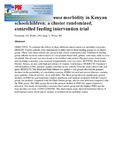| dc.contributor.author | Neumann, CG | |
| dc.contributor.author | Bwibo, NO | |
| dc.contributor.author | Jiang, L | |
| dc.contributor.author | Weiss, RE | |
| dc.date.accessioned | 2013-04-15T06:26:50Z | |
| dc.date.available | 2013-04-15T06:26:50Z | |
| dc.date.issued | 2013 | |
| dc.identifier.citation | Public Health Nutr. 2013 Mar 28:1-12 | en |
| dc.identifier.uri | http://erepository.uonbi.ac.ke:8080/xmlui/handle/123456789/15922 | |
| dc.identifier.uri | http://www.ncbi.nlm.nih.gov/pubmed/23537728 | |
| dc.description.abstract | OBJECTIVE:
To examine the effects of three different school snacks on morbidity outcomes
DESIGN: Twelve schools were randomized to either one of three feeding groups or a Control group. There were three schools per group in this cluster randomized trial. Children in feeding group schools received school snacks of a local plant-based dish, githeri, with meat, milk or extra oil added. The oil used was later found to be fortified with retinol. Physical status, food intake and morbidity outcomes were assessed longitudinally over two years.
SETTING:
Rural Embu District, Kenya, an area with high prevalence of vitamin A deficiency.
SUBJECTS:
Standard 1 schoolchildren (n 902; analytic sample) enrolled in two cohorts from the same schools one year apart.
RESULTS:
The Meat and Plain Githeri (i.e. githeri + oil) groups showed the greatest declines in the probability of a morbidity outcome (PMO) for total and severe illnesses, malaria, poor appetite, reduced activity, fever and chills. The Meat group showed significantly greater declines in PMO for gastroenteritis (mainly diarrhoea) and typhoid compared with the Control group, for jaundice compared with the Plain Githeri group, and for skin infection compared with the Milk group. The Milk group showed the greatest decline in PMO for upper respiratory infection. For nearly all morbidity outcomes the Control group had the highest PMO and the least decline over time.
CONCLUSIONS: The intervention study showed beneficial effects of both animal-source foods and of vitamin A-fortified oil on morbidity status | en |
| dc.title | School snacks decrease morbidity in Kenyan schoolchildren: a cluster randomized, controlled feeding intervention trial | en |
| dc.type | Article | en |
| local.publisher | Departments of Community Health Sciences and Pediatrics, University of California, Los Angeles | en |
| local.publisher | Department of Paediatrics and Child Health, University of Nairobi | en |

